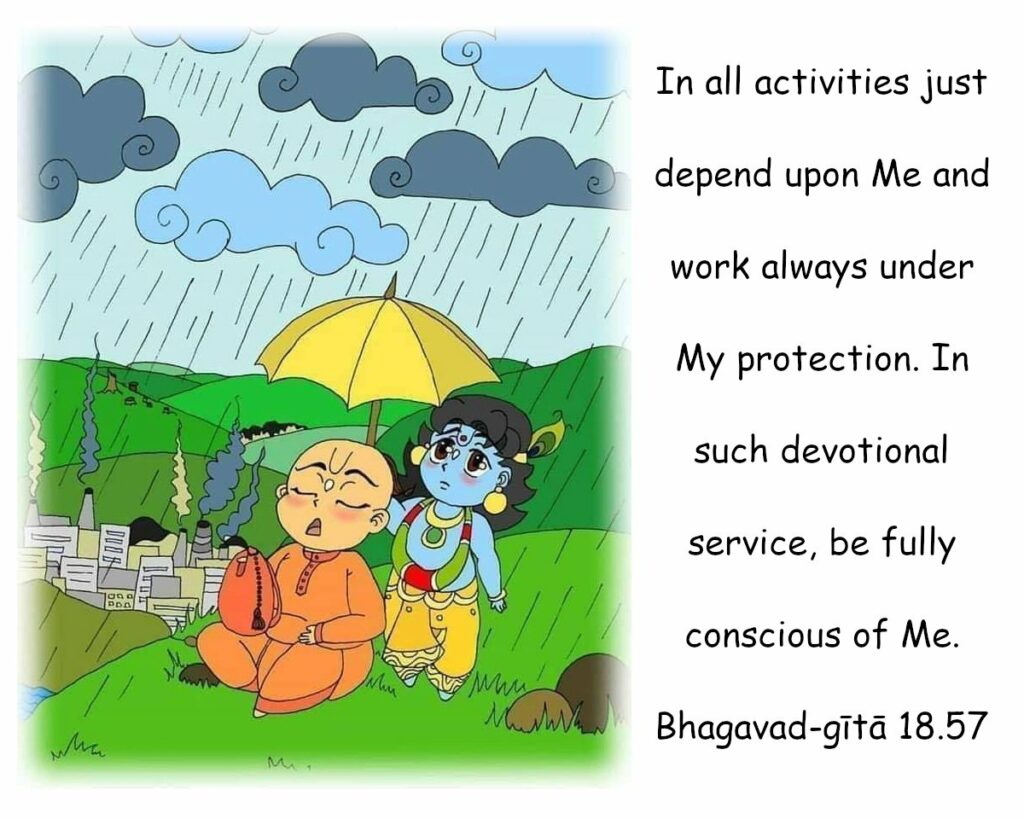चेतसा सर्वकर्माणि मयि सन्न्यस्य मत्पर: |
बुद्धियोगमुपाश्रित्य मच्चित्त: सततं भव || 57||
chetasā sarva-karmāṇi mayi sannyasya mat-paraḥ
buddhi-yogam upāśhritya mach-chittaḥ satataṁ bhava
chetasā—by consciousness; sarva-karmāṇi—every activity; mayi—to me; sannyasya—dedicating; mat-paraḥ—having me as the supreme goal; buddhi-yogam—having the intellect united with God; upāśhritya—taking shelter of; mat-chittaḥ—consciousness absorbed in me; satatam—always; bhava—be
Translation:
Mentally surrendering all actions to Me, having Me as the highest goal, resorting to Buddhiyoga, fix your mind ever on Me.
Commentary:
Chetasa: The body may be engaged in various activities, but the mind should be clear enough to know that all those actions are resigned to the Lord. So the Lord here teaches resignation of the fruits of actions and not actions themselves. It is useless to give up the actions of the body while the mind wanders always in all directions, thinking of so many worldly things. On the other hand, while the body carries on its prescribed duties, to be thinking of the Lord and giving up the fruits of action to Him, leads to Moksha. Therefore the word ‘chetasa‘ is used here. Knowing that it is the Lord’s power that is running through him and that his actions have no relevance to him except as the work of the Lord, is the secret of Kamayoga.
Buddiyogam: In the Tenth Discourse, the Lord has already declared that. He would bestow ‘buddhiyoga’ on his faithful devotee, (dadami buddhiyogam), Concentration of mind and enquiry into the Self are gifts of God to the devotee. This becomes clear when man attempts to clear the mystery of Self-knowledge. The enquiring mind is disturbed by a hundred doubts and fears, longings, desires and attachments. The path of enquiry is cleared up by God’s grace. The wavering mind is brought to a state of steadiness. One-pointed attention on the Divine becomes possible. The enquirer then finds that the idea of ‘I’ and ‘mine’ are only fictitious creations of the mind, and what exists although is Atma (God). The word ‘satatam‘ shows that the memory of the supreme Reality should be constantly present in the consciousness, for otherwise, Maya would plunge him into Tamas and drag him down to the plane of sense-enjoyments. So, the sincere seeker should keep the thoughts of God fresh and clear always.
Matparah: Knowing that the whole of the objective world is insentient and ephemeral, the wise man should consider Paramatma as the highest goal.
Question: What should the jiva do to attain Paramatma?
Answer:
- Mentally, he should surrender all actions to God,
- He should consider God as the highest goal,
- He should resort to Buddhi-yoga and carry on enquiry into the Self,
- He should keep his mind fixed constantly on God.
Question: What is the Lord’s teaching? Is it the renunciation of action or the renunciation of the fruits of action?
Answer: It is not the renunciation of action but the fruits of action that is emphasised here. Though the body is engaged in various activities, the devotee is called up to surrender both the actions and their fruits to God.
Question: What should man consider the highest goal and why?
Answer: Paramatma, as He is the only permanent reality.
Question: On what should the mind be fixed constantly?
Answer: On Paramatma.
Bhagavad Gita: Chapter 18 🔻 (78 Verses)
| 01 | 02 | 03 | 04 | 05 | 06 | 07 | 08 | 09 | 10 |
| 11 | 12 | 13 | 14 | 15 | 16 | 17 | 18 | 19 | 20 |
| 21 | 22 | 23 | 24 | 25 | 26 | 27 | 28 | 29 | 30 |
| 31 | 32 | 33 | 34 | 35 | 36 | 37 | 38 | 39 | 40 |
| 41 | 42 | 43 | 44 | 45 | 46 | 47 | 48 | 49 | 50 |
| 51 | 52 | 53 | 54 | 55 | 56 | 57 | 58 | 59 | 60 |
| 61 | 62 | 63 | 64 | 65 | 66 | 67 | 68 | 69 | 70 |
| 71 | 72 | 73 | 74 | 75 | 76 | 77 | 78 |
